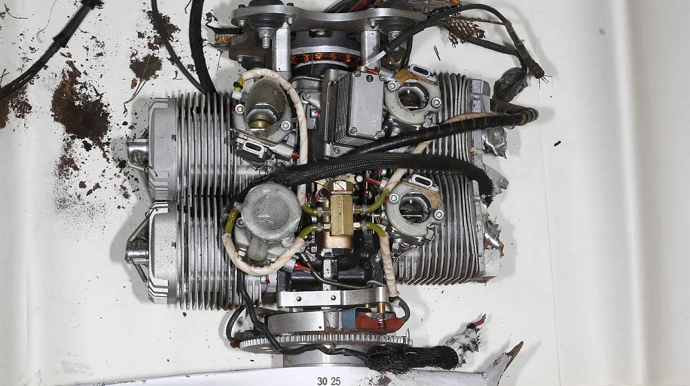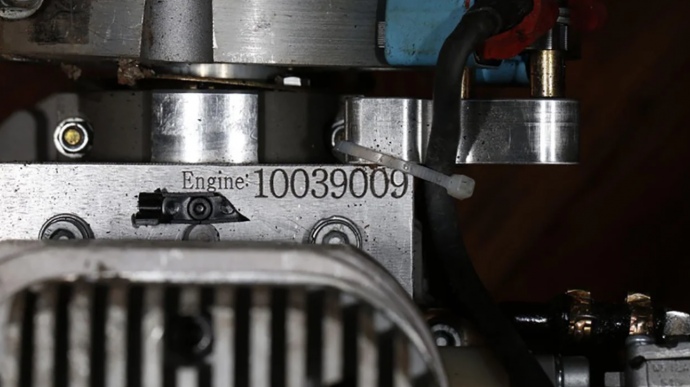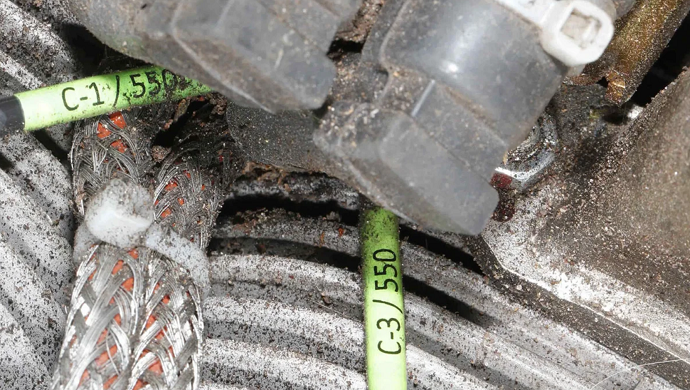German technology stolen by Iran almost 20 years ago found in Shahed drones
An engine based on German technology stolen almost 20 years ago has been discovered in the Shahed-136 drones that Russia bought from Iran. Source: CNN referring to Conflict Armament Research (CAR), a British research organisation Details: Between November last year and March 2023, Conflict Armament Research examined the components of 20 Iranian drones and munitions in Ukraine, about half of which were Shahed-136s.
The engine was developed by the Iranian company Oje Parvaz Mado Nafar, known as Mado, based in the city of Shokuhie in Qom Province. Last December, the company was sanctioned by the United Kingdom, the United States, and the European Union.
CAR researchers found Mado markings on the spark plug caps in the drone's engines, as well as sequences of serial numbers used by Mado.

A Mado MD-550 engine, documented in Ukraine last December
According to CNN, according to Western governments and the UN, Mado plays a crucial role in Iran's drone industry. The same sequence of serial numbers was also noticed by UN investigators looking into drone attacks on Saudi Arabia, allegedly carried out by Iran's Houthi allies in Yemen, as well as missile attacks on Abu Dhabi last year.
We have launched English Twitter! Follow us!
Taimur Khan, a Gulf analyst at CAR, told CNN that Iran's UAV systems are constantly being improved and modernised and "have proven to be increasingly accurate in terms of guidance and targeting systems and jamming capabilities."
The design of the engine shows that over the years, Iran has made significant efforts to acquire Western technology for its drones and missiles, despite widespread international sanctions. In 2006, Iran illegally purchased drone engines from the German company Limbach Flugmotoren. Three years after that, Iranian engineer Yousef Abutalebi announced that his company had created an engine for a UAV.
According to CAR, the company appears to have tried to conceal its role in the creation of the Shahed drones. Investigators found that the original serial numbers on the drone components found in Ukraine had been erased, apparently in an effort to conceal their origin.
 Serial number on an MD-550 engine manufactured by Mado, documented in Kyiv on November 2, 2022
Serial number on an MD-550 engine manufactured by Mado, documented in Kyiv on November 2, 2022
"These modifications have prevented investigators from identifying procurement networks that facilitate the international supply of key components to Iran," CAR's report says.
 Cables in the engine, documented in Kyiv on 20 January 2023
Cables in the engine, documented in Kyiv on 20 January 2023
Other Western components purchased and copied by Iran include parts of Czech-made missiles. A 2020 report by UN experts stated that the engine of Iranian Quds-1 missiles used in attacks on Saudi oil refineries last year was an "unlicensed copy of the TJ-100 jet engine manufactured by PBS Velka Bites" in the Czech Republic. The company said it had never supplied the engine to Iran or Yemen.
At the same time, the newspaper emphasises that Iran has become "an expert in evading control" over technology, in some cases using shell companies. A UN panel of experts found that parts exported by a Czech manufacturer to a company in Hong Kong in 2010 ended up in Iranian missiles used in 2019. CAR's Taimur Khan says that Iran "has acquired Western components and technology for its UAV program by taking advantage of the lack of transparency in the supply chain," making component identification a critical method in improving export controls and sanctions mechanisms.
CNN writes that the proceeds from the sale of hundreds of Shahed-136 drones to Russia will likely be reinvested in further improving the industry. Khan believes that "given the fact that Russia has been capturing advanced Western weapons on the battlefield - such as the Javelin anti-tank missile - and that military cooperation is growing between the two countries, with Iran having proven 'achievements' in this regard, it is likely that they will work together to copy these types of systems." Quote from CNN: "There is also the possibility that Russia will use its cooperation with Iran to develop its own military drone capabilities.
But until that happens, the Russian military is likely to remain a willing buyer of hundreds of other drones from Iran, a country that has turned sanctions evasion into a fine art in building its own weapons industry."
Journalists fight on their own frontline. Support Ukrainska Pravda or become our patron!